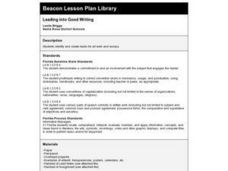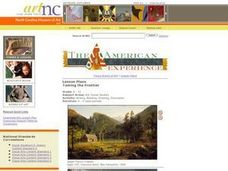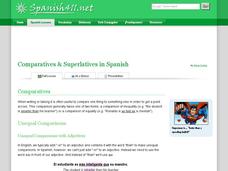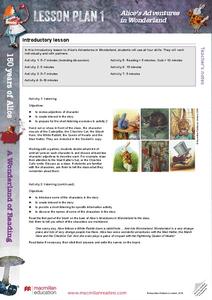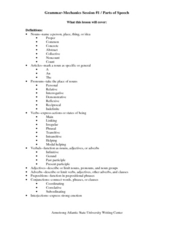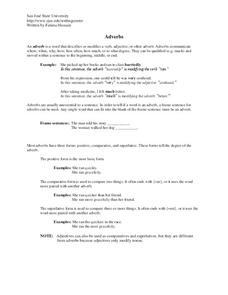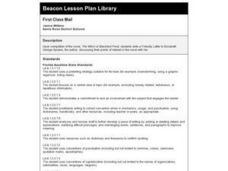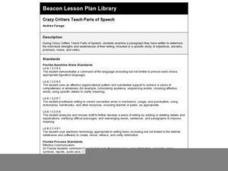Jordan School District
Who is Worth More Than Gold?
Young writers compose an opinion piece that details who they feel is worth more than gold.
Curated OER
Living Sentences
First graders practice writing full sentences. In groups, 1st graders play a game in which they build sentences using nouns, verbs and adjectives. They investigate how to put a sentence into a meaningful order.
Curated OER
How Many, How Much, How Tall
For this ESL adjectives vocabulary worksheet, students analyze 7 pictures that depict objects with distinct characteristics. Students match the pictures to the adjectives that describe them.
Curated OER
Leading into Good Writing
Discuss the importance of a lead in writing with your upper graders. They examine several examples of leads from literature and practice writing leads for pieces of artwork. They then select a topic from a list and write an introductory...
Curated OER
Taming the Frontier
Students examine paintings by Thomas Cole and Jasper Francis Cropsey as windows into American frontier life. They consider the pioneer's relationship with nature and the role of Native Americans in the pioneer's lives and settlements.
Curated OER
A Nice Story
Explore word choice in writing. Your class listens to a short story entitled "A Nice Day" (included) and discusses how the story could be improved. Pupils replace the word nice throughout the story with various synonyms, then reread the...
Roald Dahl
The Twits - Dirty Beards
The problem with beards is that they collect a lot of food. The first lesson in an 11-part unit related to The Twits by Roald Dahl explores the hairy jungle that is Mr. Twit's beard. A concluding project has learners create their own...
Roald Dahl
The Twits - The Wormy Spaghetti
What do spiders' legs and an octopus's eyeball have to do with metaphors? The fourth lesson in an 11-part unit designed to accompany The Twits by Roald Dahl uses disgusting foods to teach about metaphoric writing.
Curated OER
Comparatives & Superlatives in Spanish
Who is taller? And who is the tallest? Help your Spanish language learners express comparison by teaching them about comparatives and superlatives. The first part of the webpage includes in-depth explanations with examples of...
Macmillan Education
Know Yourself
After completing a short self-assessment, partners use the provided questions and take turns acting as life coaches.
Macmillan Education
Alice's Adventures in Wonderland
Follow Alice as she travels through Wonderland with a set of lessons based on the first chapter of the book. Learners discuss key moments and ideas from chapter 1 before answering a series of comprehension questions about what they have...
Perkins School for the Blind
The Mystery Box - Making Observations and Collecting Data
Making observations and collecting qualitative and quantitative data is a vital skill all scientists need to practice. Help your scientists with partial and no sight learn how to use their other senses to make observations for...
Curated OER
Grammar-Mechanics Session #1/Parts of Speech
As part of a grammar lesson, use these sentences to identify parts of speech. There are no directions, but parts of speech are available. The resource contains ten sentences in all.
DK Publishing
Big, Bigger, Biggest
Which water creature is the biggest? Youngsters look at an image of a big shell, then draw a bigger shell next to it. They do the same for a big fish. Next, learners practice with the superlative as they circle the biggest duck and frog....
San José State University
Adverbs
While designed for college students, this review of adverbs could be used in a high school classroom as well. The worksheet begins with a detailed overview of adverbs which is followed by a six-question activity.
Curated OER
Tree Identification - Up Close And Personal
Fourth graders go to an outdoor area and are assigned a specific native plant to observe. They read about and answer questions about their tree. They draw the tree. Finally, 4th graders teach the rest of the class about their tree.
Curated OER
Computers: Caught in the Web
Young scholars conduct Internet research about various websites noting the design and appearance of them. Working in small groups, they compare and contrast the sites and share their opinions of them with classmates. They also examine...
Curated OER
ACROSTIC POETRY
Students use newspapers or magazines to create an acrostic poem where words are divided into parts of speech.
Curated OER
The Wilderness Concept: Our National Parks, History and Issues
Students examine the history of the National parks. In groups, they discuss the concepts of conservation and preservation. They discuss the use of natural resources and how some are renewable and non-renewable. To end the instructional...
Curated OER
King Arthur and the Knights of the Round Table by Stephen Colbourn
In this study guide worksheet, students respond to 8 short answer questions designed to be used prior to reading, while reading, and after reading King Arthur and the Knights of the Round Table by Stephen Colbourn.
Curated OER
First Class Mail
Pupils read The Witch of Blackbird Pond, and write a friendly letter to Elizabeth George Speare, the author, discussing their points of interest in the novel with her.
Curated OER
Crazy Critters Teach Parts of Speech
Students create pieces of writing about a creature they have created. They examine the parts of speech and how they are used in their writing to see how they can write more specifically.
Curated OER
Whose Voice Do I Hear?
Fifth graders examine the power of voice in writing by completing a story using words following a particular voice. They take simple nursery rhymes, then attempt to put their own voice to a revised version. An interesting instructional...
Curated OER
Verbs in the Past
Students listen to a story and discuss the verbs in the past tense. They complete a worksheet activity to practice forming the past tense of irregular verb forms.





